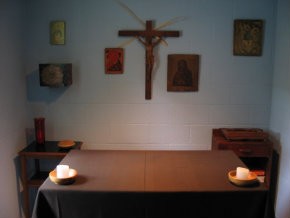Monkish ways

When I was growing up in the 1970s, I loved hanging around the college where my dad taught in the department of religion. My ballet teacher lived at the edge of the campus, and sometimes, after my lesson, I would walk over and find my dad and his students sitting together around a seminar table in the late afternoon light. We called them the monks of Atlantic Christian College—MOACC, for short. By the time I slipped into the classroom where they gathered a couple of times a week, they had already sung the Divine Office and were deep into what they called "Chapter." They might be discussing a book—Thomas Merton's New Seeds of Contemplation is the one I remember best—or dealing with the business of the Order.
The Abbey of Gethsemani had supplied MOACC with psalters marked for chanting. Bound in plastic rings and covered with the kind of cheerful contact paper we used to line our kitchen shelves, these psalters were the heart of the monks' prayer. One of the Gethsemani monks had taught my dad and his students to chant during one of their visits to the monastery. The sound of it was beautiful—gravity and sweetness combined.
When my father was a graduate student at Vanderbilt Divinity School, his teacher Bard Thompson took his students to Gethsemani. In those days there were 250 monks in the abbey, singing the offices in Latin. My dad had never heard anything like the cantor's "In nomine Patris, et Filii, et Spiritus Sancti" ricocheting off church walls, and it entered him in some permanent way. So did the conversations that Thompson arranged for his students to have with Merton. Those encounters with a monk who believed that the wisdom of monastic practice had something to offer everyone led my father, as a professor, to fill his own car with students and drive 12 hours from eastern North Carolina to the monastery in Kentucky.




